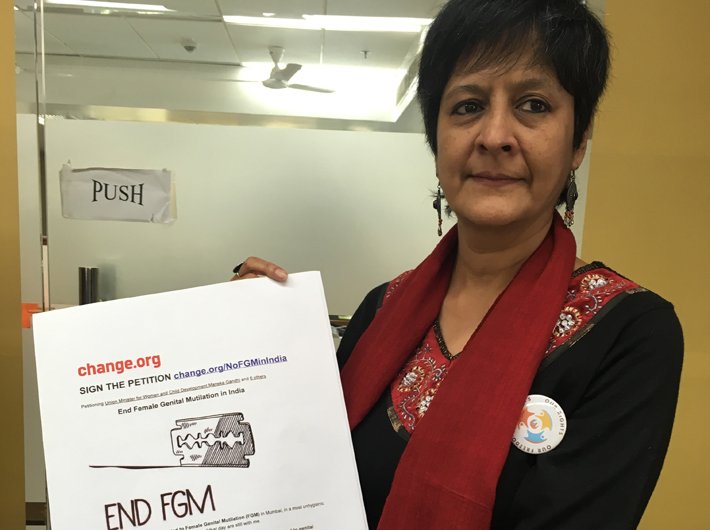Masooma Ranalvi said that mobilising the people for the cause has not been easy, but starting the petition was like opening flood gates
Masooma Ranalvi, a victim of Female Genital Mutilation (FGM), has submitted a petition signed by 85,000 people to National Commission of Women against this practice.
She started Speak out on FGM, a group of Bohra women, to create awareness. Her two petitions on Change.org appeals to the government and United Nation to end FGM.
Q. Last year, you started the second petition on FGM, asking the UN to recognise India as one of the countries where FGM is still practiced. How to do you plan to take this movement forward?
The initial petition started in December 2015 appeals to the ministries like women and child development, health and law. However, it is yet to be acknowledged. Through the second petition, we want to draw the attention of UN on FGM, so that it could lay stress on Indian government to take up the matter urgently. FGM is a violation of human rights, a form of violence against girls and women. It is important to mobilise people against this harmful tradition. We have a multi-pronged strategy to work at the community level and to engage with law makers and women and child development ministry.
READ: Dawoodi Bohra women are seeking to end the practice of female genital mutilation
Q. How difficult it has been for you to mobilise people against FGM?
Mobilising the people for the cause has not been an easy journey. Starting the petition was like opening flood gates. Lot of women had a similar experience and they shared how it affected their lives. There was a certain section who called us shameless as we discussed about the sexual parts in front of everyone. Still, we saw women coming together to support us. Some preferred keeping their identities hidden due to their fear of being ostracised from the community while many were up front. The anger is palpable now.
Q. What percentage of women in India go through Female Genital Mutilation?
Khatna is a 1,400-year old practice. At the age of seven, a portion of girl’s clitoris is cut. This age-old custom is performed secretly to sexually curtail women, so she doesn’t become promiscuous. Nothing has changed in all these years. 80 percent of the Bohra community girls, mainly residing in Gujarat, Maharashtra, Rajasthan and Madhya Pradesh are subjected to it. There are an estimated one million people belonging to the Bohra community in India. There are no exact figures on the prevalent rate of this harmful traditional practice. We could roughly estimate that hundreds of thousands of girls may be subjected to or are at risk of FGM. Though the numbers are not so high in comparison to global figures, still it should be stopped in India.
Q. How FGM affects girls biologically and psychologically?
Since it is performed without any anesthesia, the girl is put through the risk of excessive bleeding, urinary infection, genital tissue swelling and other health issues. More importantly, it leaves behind a psychological scar- the betrayal of trust between mother and daughter. A seven-year-old girl is unaware of the happenings around her because the task is performed in absolute secrecy. Everything happens with deception. So, it affects the young girl’s trust on her mother.

